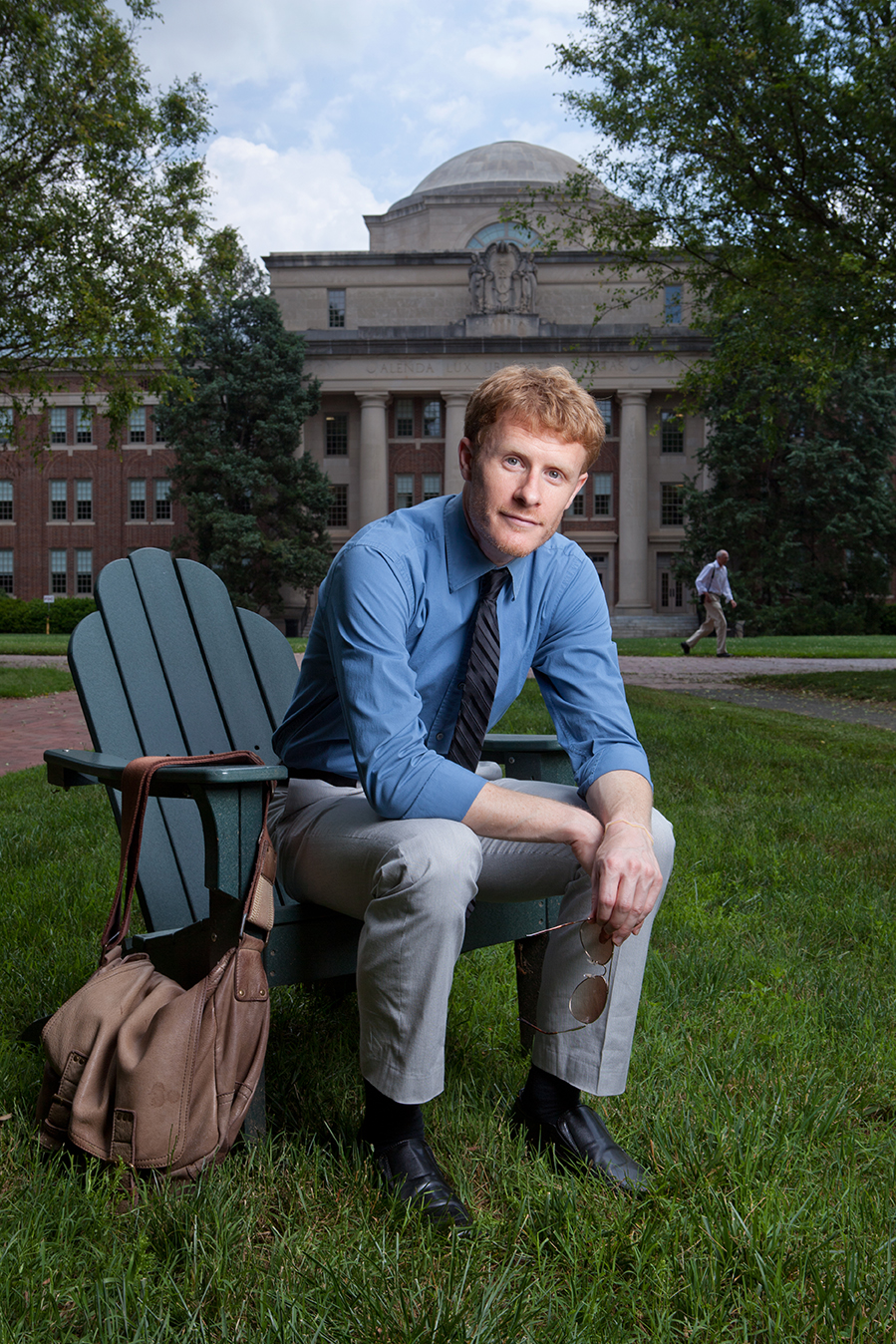Josh Putnam

By: Cynthia Adams | Photos By: Nancy Evelyn
Josh Putnam’s frontloadingHQ blogspot was the definitive go-to resource major news organizations like The New York Times and The Huffington Post used during the 2012 presidential election. He “writes to election junkies [and] election nerds,” and has done so since he began blogging during his graduate days at UGA.
Josh Putnam, now a visiting political science professor at Davidson College, enters a downtown shop and exchanges pleasantries with familiar locals. In this small North Carolina college town, near Putnam’s Gastonia hometown, there is the usual give-and-take rhythm of daily life. But not much is actually happening, apart from a boutique shop getting a new sign erected. For a youthful, slim, intense 35-year-old with a jones for political blogging and forecasting, the pace of life is perhaps a bit boring. But Josh Putnam is too polite to admit that until pressed.
He shucks back his light hair, glances into an emptied cup in his hand, and confesses he’s “having some serious withdrawal.” And Putnam does not mean caffeine. nothing is quite so over as an election when it’s over—and for those in the thick of the action, it was like going from 85 mph to 15. Putnam had more than a thousand daily hits on his political blog, FrontloadingHQ, in the months prior to election Day in 2012. By election Day Putnam says the number was “nearly 10,000.”
Just five months earlier, Putnam’s number was on speed dial for most news-gathering organizations. the game was on “once The New York Times contacted me in August of 2011.” The caller was Jeff Zeleney, then the NYT’s national political reporter. Establishment news figures now knew Putnam’s name, and they followed his blog.
“It was a serious part of my routine. When it was over, I had a pretty big void to fi ll,” Putnam admits. Filling the void involves turning to book writing which will distill Putnam’s dissertation research, his blog, and election rules.
It was a big void, because the blog was now a big deal. The Daily Beast, a news blog, asked early in the presidential race, “Is Delegate Counter Josh Putnam the Nate Silver of the 2012 Race?”
(Statistician and journalist Nate Silver was the one analyst who correctly called the 2008 and 2012 elections. “Silver actually missed on Indiana in 2008,” Putnam corrects via email, “just one state better than my forecast that year.”) This fact catapulted Silver from a sportswriter to a reporting superstar who now writes for elite news agencies. Silver, who writes the political blog FiveThirtyEight, also writes for The New York Times, The Wall Street Journal, and Esquire, among others.)
Even Silver acknowledged Putnam’s work. In his own Wikipedia entry, Silver cites Putnam as among “one of at least three academic-based analysts who were broadly correct about the elections.”
But Putnam dismisses it. “I am mentioned there, but I doubt Nate actually wrote that. He and I are marginal acquaintances. We have exchanged data in the past.”
Writer Ben Jacobs observed that Putnam’s blog was the definitive go-to, the resource every reporter now turned to—not the major news organizations. Jacobs’ piece referred to Putnam’s understanding of the delegate selection process (the presidential nomination process) and their attendant votes. Putnam had teased out the complexities, the most obscure aspects of elections.

Josh Putnam (PhD in Political Sci.) outside of his Chambers Bdg. office as a visiting professor at Davidson College, NC.
“That information is less well-known and understood than the Electoral College process,” observes Putnam. “The expertise of that process is my claim to fame. The media really came to know my Electoral College work at that point.”
From as early as July of 2012, Putnam correctly identified the number of electoral votes per candidate, without wavering. Today, however, Putnam merely shrugs it off.
Jacobs quoted another political insider who called Putnam a “breakout star” saying he was “top of the list.”
Still, it is lonely sitting at the top of the list of political analysts. On November 6, 2012, Putnam says he was huddled alone in a corner of the Davidson student union into the wee hours of the morning with a laptop. “It’s nerve wracking,” he admits. Later he amends, “True, but that is part of the fun.”
Still counting, still writing, still cogitating. Putnam was hammering out his political blog, FrontloadingHQ, through the long hours of election night. “I got a call from CBS at 5 or 6 p.m.,” he recalls. They asked Putnam to be available for a phone call that night, “to discuss it if a tie.” The numbers at one point suggested that possibility to some, but not to Putnam. He stuck to his analysis. Obama would win 332 Electoral College votes to Romney’s 206.
Putnam says that after the 2008 election, ‘I used gubernatorial elections to test my weighted averaging formula. I hoped to do that in 2010, but was in transition.” The transition was moving from student to lecturer at Wake Forest University in Winston-Salem, N.C.
Putnam was all over the national media. As in, The New York Times. CBS. NPR’s “Fresh Air” program. The New Yorker. The Huffington Post. Salon. Politico. Fill in the blank with a major news radio program, publication, or television show, and Putnam’s political blog was cited. “I was on or cited in and on those publications because of the delegate selection expertise in late 2011 and early 2012. Things had slowed down some by Election Day,” Putnam says later.
Now, even by his own reluctant admission, Putnam’s name was “almost famous.”
“I appreciated being contacted,” he says. “I enjoyed the platform.” He says he enjoyed adding a voice on PBS news, and giving a daily rundown in the media. “But the thing that struck me about the print stuff was the extent to which they had a story in mind.”
It did not hurt that Putnam was physically in the right position at the right time. The early september Democratic National Convention was in Charlotte, only a short drive from Davidson. The late August Republican National Convention convened in Tampa. Putnam held media credentials and attended both conventions.
The self-described introvert says he “writes to election junkies, election nerds. It’s a narrow topic,” and has done so since he began blogging during his graduate days at UGA. “I started a blog in the lead up to the primaries [in 2007] and didn’t think it would be looked at beyond me. I’ve been blogging six years.”
By Election Day of 2012, Putnam had written 265 posts.
He completed his doctorate in political science at Georgia in 2010. (“I started in 2002 and left with a job,” Putnam says, explaining that he took a year off studies after undergraduate school at UNC-Chapel Hill.) That first job was at Wake Forest University, where he filled in for a professor who was on sabbatical.
Today, he still gets fair traffic on his blog from as far as “the UK and Australia. I am gaining traction in both parties. A lot of folks in grad school socialize/network at conferences. I made those sort of connections through the blog.” Putnam adds a caveat: “I never intended for it to be what it is.”
But this is hardly what the press thinks. They feel Putnam has an uncanny ability with his political metrics and analyses.
What shocked many political pundits most were sometimes gross miscalculations by political observers and insiders.
A blogger named Sandy Goodman (Goodman retired from nBC nightly news to become a freelancer) stated, “the astounding 2012 presidential election ended four days later, on Saturday, when President Obama was finally declared the winner of Florida’s 29 electoral votes, raising his total to 332 against Mitt Romney’s 206 and assuring him a margin of more than three million popular ballots.” But what Goodman declared most astounding was this: the data had been there, and suggested an outcome that had taken even Romney by great surprise. Many voters, like Romney, had distrusted the data.
Josh Putnam’s home turf was in the calculations. He had staked everything on his metrics and close analyses of key factors. “Political scientists who focused on the fundamentals were right,” he says. Fundamentals included key factors, such as economic indicators and the President’s job approval ratings.
Six days after Election Day, Davidson College President Carol Quillen grabbed Putnam’s arm. She introduced him to David Brooks, who was appearing as a guest speaker on campus. Brooks, who is a NYT columnist and also a PBS commentator, analyzed the election during his campus appearance.
Not bad for a visiting assistant professor, Putnam admits, saying he hopes to continue on the Davidson faculty beyond next year. A graduate student’s blog has turned into something even he could not have forecasted.

It’s nerve wracking,” Putnam admits, “but that is part of the fun.”
In the Aftermath… of Math
What did Putnam have to say about the election process in post analysis months later? After the din died down and the votes were counted (as he predicted) would America ever put an end to the electoral College? It had been the hot center of so much contention.
“The thing about politics is, you go with what works until it is apparent it is broken,” he observes. Despite the heated rhetoric in the mainstream media about the dysfunction of an Electoral College, Putnam doesn’t have a particular preference to get rid of it. “We will never eliminate it,” he says flatly. “the votes will never be there; just deal with it.
As for his own political ambitions, Putnam says he has none. “I was the fifth grade class president,” he says, “but I ran and lost for senior class president in high school.”
Before there was Frontloading HQ
If anything could have predicted Putnam’s political interests, it might have been two things: a politically engaged family who also exposed their son to a larger world.
From childhood, Putnam remembers his parents as news watchers who dragged him to political rallies. He remembers an infamous North Carolina senatorial campaign in 1984. “I became interested accidentally.”
According to the Kennedy School at Harvard University, the race between incumbent North Carolina senator Jesse Helms and Governor Jim Hunt “was the country’s most expensive senate race ever and arguably its meanest. In 1982, Jim Hunt was leading in the polls by a 14 to 20 point margin. Two years and $25 million later, after an intense, vitriolic media war, Hunt was the loser by a margin of four points.”
Helms had long owned a Raleigh radio station, and Hunt had been a popular governor. That race played out in the absence of a mainstream Internet or social media. the media became vitally important during a race that spawned many textbook cases and books.
In 1995, Putnam went to Russia with a program called “People to People.” Upon his return, a local journalist asked what he wanted to do. “I told him I wanted to study political science.”
Russia, Putnam says, made him “think about our place in the world.” The real eye opener was the Red Square, which he describes as vivid, rather than a grim, monotone reality. “I remember going into the Red Square and seeing the colors. that wasn’t the stereotype.” He says he returned to Gastonia altered. However, despite the travel, he says, “I don’t follow international elections.”
After finishing his undergraduate studies in North Carolina, Putnam ran a Chapel Hill video store as he pondered next steps. He chose UGA because of two leading scholars in campaigns and elections. This, he stresses, is a rarity. One is Paul Gurian, who advised Putnam’s dissertation. The other is Audrey Haynes. Since graduating, Putnam has given a talk at UGA, but mainly he lectures and blogs from Davidson, dissecting all things political.
FrontloadingHQ is where he plies his knowledge, much as he has since his UGA days.








